INTERVIEW: FIRE&DUST MEETS KEN CUMBERLIDGE
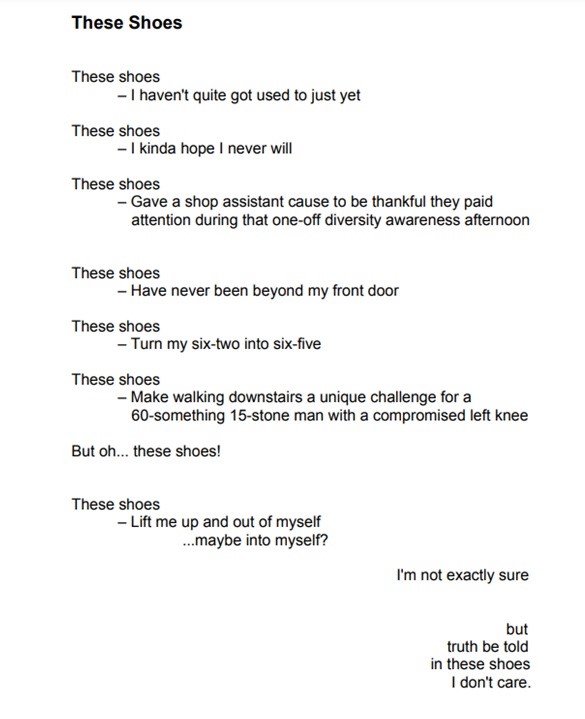
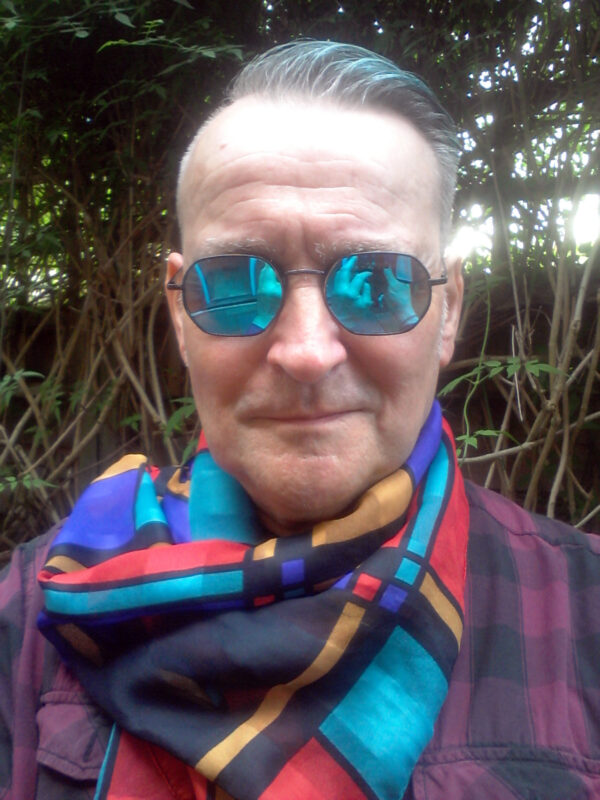
Born in Birkenhead, Ken Cumberlidge cut his performance teeth on the Liverpool pub poetry scene of the 1970s, and has never recovered. He writes about love, sex, nature, loss, personal identity and queerness, with an occasional foray into the eerie and macabre. Poke him with a sharp enough stick and he may even wake up long enough to get shouty about politics.
After twenty-three years in East London, in 2011 Ken moved to Norwich, where by and large people leave him alone. He can, however, be lured out of cover by the promise of good company and an open mic – a proclivity that has led him to become an habitué of the slam poetry/spoken word scene. He likes it. A lot.
Ken is a regional finalist at Hammer & Tongue Cambridge, 2018 and 2019. His work can be found in numerous publications, both print and online, including Ink Sweat & Tears, Runcible Spoon, Picaroon, Rat’s Ass Review and Allegro.
On 8th September 2022, Ken was the headliner at our Fire & Dust poetry event. We caught up with him after the gig, to ask a few questions…
HCE: Tell us a little about your background and journey as a writer so far. What inspired you to start creating and performing poetry?
KC: I can’t remember a time when I wasn’t writing something. I’ve always found joy in words, always loved playing with them, seeing what you can make them do: the rhythm and flow and heft of it all. It’s almost a kind of mild synaesthesia: the ‘feel’ of words well-wielded (mmm…nice phrase!) is literally a physical thrill to me.
When I was 12, I got really lucky, in the shape of a wonderful English teacher called Robert Ballard. He saw my passion for writing, particularly poetry, and made it his business to nurture it. We’d meet up in class after school, and he’d look at whatever I’d been writing, offer advice, criticism etc., even lend me books – his own books – of work by writers I wouldn’t have found on the school curriculum. I owe him a lot.
HCE: We’ve noticed you describe yourself as a ‘recovering actor’ in various bios across the internet. Can you give us some background on that?
KC: Settle in – this will be a long answer!
As a child I had a terrible stammer and was a “playground outsider” – always on the periphery of things, observing from the edge: a perennial target for bullying. I left school at 16 (couldn’t wait to escape that hell), with very little idea of what to do for a living, but I knew I loved clothes and kinda fancied the idea of being a tailor: nice, quiet creative work tucked away in the back room, not having to interact with “people” (*shudder*). None of the local firms had any vacancies for an apprentice, but one said “We have an opening on the sales floor – why not join us there, and if a tailoring job comes up…”
Of course, it never did come up, and I – still plagued with the stammer – found myself thrust into dealing with the public. Then, a revelation: I found that when I was doing my sales spiel, the stammer vanished! Inhabiting the role of salesman provided me with a kind of “security cloak”: effectively I was playing a character.
Meanwhile, I’d started going to poetry gatherings in various Liverpool pubs, and one night plucked up the courage to deliver some of my stuff. I didn’t stammer, the poems went down better than I could have expected – a very affirming experience – and I started to understand that performing to an audience was something I could do, and enjoy doing.
After several years working in menswear shops, I managed to break free: got a place studying theatre at college – originally intending to train for Stage Management. All the students had to perform, though, and having seen me do so, the tutors persuaded me to set my sights on an acting career instead. My first professional job was at Liverpool Playhouse.
HCE: Were you instantly confident sharing your poetry because of this background in performance?
KC: “Instantly” sounds a bit like it’s no effort at all, which is not ever the case, but essentially, yes: certainly more confident than I know is the case for many other poets. For me, being onstage working to an audience – that’s my safe space. Onstage, I get to control the narrative and say my piece, secure in the knowledge that the audience (or most of it, I hope) is engaged with what I’m saying. Sharing that sense of engagement – feeling a room full of people willingly consent to get onboard and go on that journey with me – is a wonderful, life-affirming thing. What’s not to like?
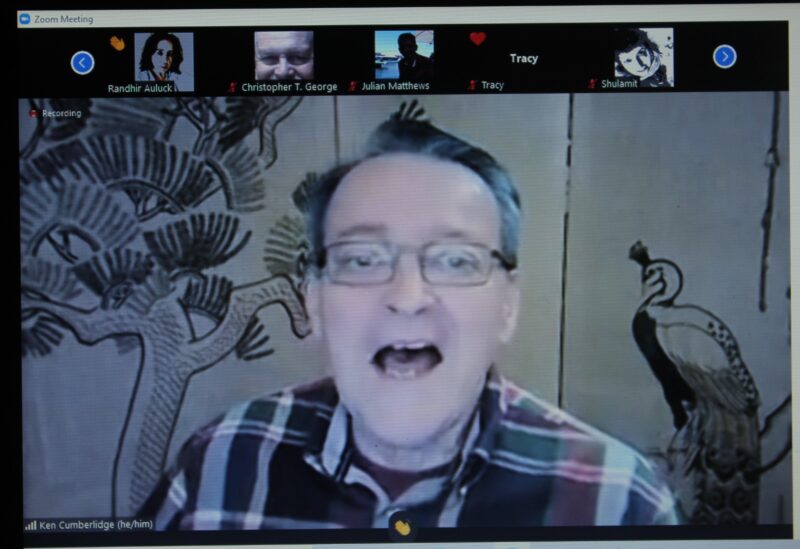
HCE: Do you have a spoken word ‘persona’, and does entering that headspace feel a bit like character acting?
KC: No, not at all. When I’m delivering my poetry onstage (or on Zoom!), the person you get is 100% me. I’m emotionally naked up there. Some of my poems may be written in the voice of a character, and in those cases it’s obvious that I will be playing a part for the duration of that poem. Otherwise, I’m just using my performance skills to convey the spirit of what I’ve written as effectively as possible.
HCE: Would you say there are themes or motifs that you tend to gravitate to in your work?
KC: Like a lot of writers, I’d hope that I’m capable of covering any subject: I certainly wouldn’t want to be thought of as a one-trick pony: “That guy who does all those poems about [insert subject here]”. Inevitably, though, I’ve found myself writing a fair bit about my own life experience. I lost my wife to cancer in 2015, so naturally that produced a shedload of grief poetry. I seem to write a lot about love in its various forms, too. But then, I’ve also written about the pleasing warmth and texture of a bag full of fresh dog turds – so go figure!
HCE: In what ways were you influenced as a writer/performer by Liverpool’s pub poetry movement – did any of the poets’ styles in particular appeal to you? Did you ever see performances by The Scaffold or Grimms bands?
KC: You couldn’t avoid being influenced by the scene (and there was a LOT more to it than just the famous names) – it was like being a biscuit dunked in a cup of hot tea.
At the time, undoubtedly I was most in thrall to Roger McGough: if I were to show you some of my very early things – and I’m not going to – you’d see it instantly. Embarrassingly pastiche-y!
My abiding memory of Adrian Henri is of his determination to own my scarf. Adrian liked to accessorise colourfully. I had collected packet-lids for weeks and sent off for a gaudy, multi-coloured scarf advertising Smarties. I wore it to a poetry night at the “Why Not?” pub. Adrian caught sight of it and offered me cash for it, there and then. I refused, and kept on refusing at every further occasion, even as the sum offered grew to far more than the scarf was worth. Then one night, as I was on the last ferry home, leaning on the rail of the open deck, it got caught by a gust of wind and disappeared overboard into the Mersey. You live and learn! 😀
Looking back, though, the member of that “big three” who’s had the biggest effect on me – the one whose work I never tire of re-visiting – is Brian Patten. Damn, if I could write one line that came anything close…
HCE: What type of poetry do you seek out for personal enjoyment? As a reader/listener, when you engage with another poet’s work, what are you hoping to get out of it?
KC: Oh crikey… ask the easy ones, why dontcha! I haven’t the faintest idea what I’m hoping to get out of any poem. Does anyone start reading a poem in the hope of getting a particular thing from it? I hope not: surely any effect is down to the poem itself, and how well it delivers its (possibly unexpected) payload.
If you like, I can list a few poets whose work I admire. In the interests of not destroying my social life, this list will not contain anyone – no matter how deserving – who is personally known to me. So, in no particular order:
BRIAN PATTEN – see above.
SALLY JENKINSON – what a poetic ‘voice’! I’m very pleased to see that right now she has a new collection – “Pantomime Horse, Russian Doll, Egg” – coming out with Burning Eye and launching Oct 9th on Zoom. Yaaaayyy!
GERRY POTTER – A stupendously gifted wordsmith and a consummate performer. AND he’s a Scouser!
FLEUR ADCOCK – I was first exposed to her work in the 1970s and have been a fan ever since. She has that thing of writing stuff that reads like off-the-cuff conversation but is actually very carefully honed and crafted. IMHO, every poet should read Fleur Adcock: she’s a masterclass.
JOHN CLARE – his collected works would have to be on my desert island.
CARON FREEBORN – OK, I’m breaking the ‘no friends’ rule here. Caron was an immensely talented writer and educator and a lovely, vital example of how to be a human. I miss her. We all do. She was unique.
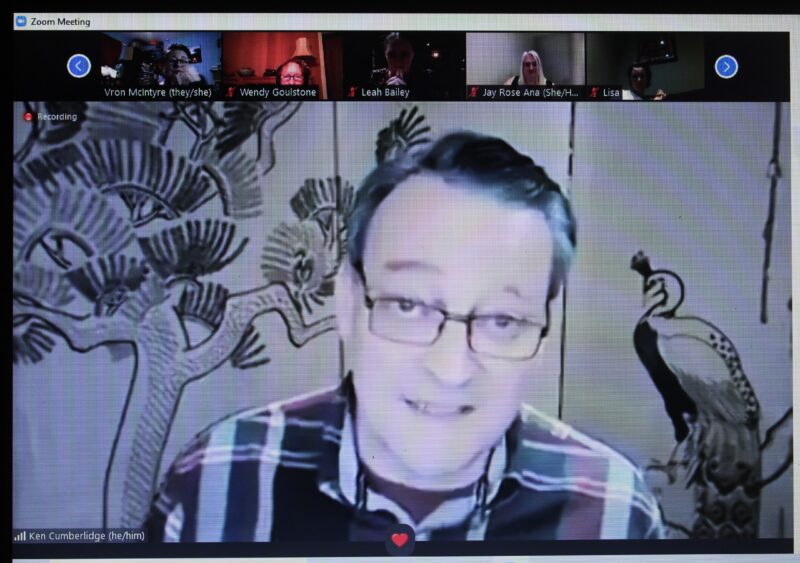
HCE: Talk us through your writing/editing process a little. Do you have different versions of your work ‘for the stage’ and ‘for the page’, or are there techniques to ensure a poem will engage audiences equally well in either context?
KC: Different versions? – No. I’m a totally intuitive writer: I work on a thing until it flows in the right way when spoken, so in that sense, all of my poems are essentially ‘scripts for performance’. However, even with the most “spoken word” of my pieces, I exercise a lot of care over how the words fall on the page, to the eye. Ideally, that ‘fall’ should serve the meaning of the piece and enable the reader to hear how the words would be delivered. No pressure, then!
HCE: In your opinion, what more should arts communities be doing to support older queer poets, to make sure their voices are platformed and heard?
KC: Money. Give us lots of money. And food. Big, hot dinners. Now.
No, seriously: I don’t think any special measures are required. Just remember that we exist and have something valid to say, and book us for gigs! It’s not rocket science.
HCE: Several of the poems you performed at Fire&Dust – such as ‘Lemons’ and ‘These Shoes’ – originated as responses to prompts in writers’ groups. Are you a star pupil who tends to create complete poems during the prompt exercises, or does a lot of development and polishing work happen afterwards?
KC: I don’t believe in star pupils. Everyone writes to their abilities on any given day. Some of my poems pour out of me almost unbidden, to arrive virtually fully-formed; others take weeks of furious word-bashing slog. It’s a crapshoot.
There’s only one writers’ group I attend: the Allographic Write-In on Zoom, every Sunday afternoon, run by Fay Roberts. It’s not a workshop as such, just a space for writers to come together and make time for the possibility of producing something, and to support each other, with no targets or expectations in any direction. That’s why I like it.
HCE: How does it feel to have been a finalist in not one but TWO Hammer & Tongue regionals? Do you enjoy competing in slam poetry events?
KC: I got into slamming by accident. In October 2017 I went to a H&T Cambridge slam just as an audience member, because the headline act was Sally Jenkinson. Prior to travelling, I’d emailed Fay Roberts – who I’d never met – to ask when the event ended, so I could be sure to catch my train back to Norwich. Somehow, the message must have got a bit garbled, because halfway through the event, when Fay read out the list of slammers… my name was on it! I had a choice: throw my hand up and say “Noooo, not me!”, or just bite the bullet and do… something. I opted for the latter. With no preparation, I got up and did the only thing I was reasonably sure I could deliver from memory. It was WAY too long for a slam slot – 5 minutes! – but the audience really warmed to it and it scored well. “That was fun,” I thought. “I’m going to come back and do this again – and this time I’ll be prepared.”
I enjoy slamming a lot, but I am not and never will be a “career slammer”. Some poets are slam specialists who build their reputation on how many slams they’ve won. I do it purely because it’s fun, it’s a good performance discipline, and it’s a way of getting my work heard by an audience. Winning is a great ego boost, of course, and when I’m taking part I give it everything I’ve got, but I’m not hungry for glory. I turn up, I do what I do, and occasionally surprise myself by winning something. That’s enough for me.
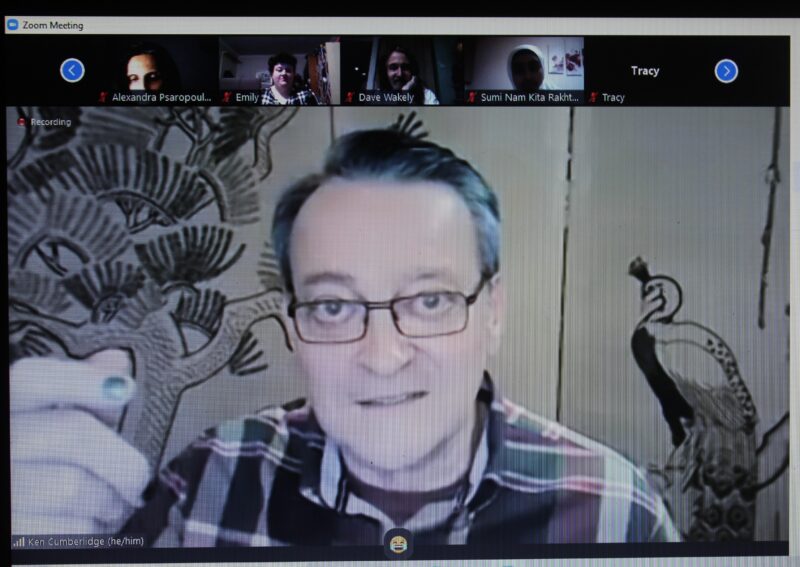
HCE: What’s next on the horizon for you? Are you already working on projects/booked for upcoming performances?
KC: Yes – my next gig is on October 19th, at Fen Speak, Ely. This will be an in-person event, held at the Babylon Art Gallery. Keep an eye on the Fen Speak Facebook page for deets.
Future plans? More and more often now when I do gigs – either in-venue or on Zoom – people ask “Where can I buy your book?” Stifling a sob, I have to tell them that there is no book – and they’re always surprised that I’m not already in print. Consequently, my next big goal is to get a pamphlet or collection out. So if there happen to be any publishers reading this… PLEASE CONTACT ME. I wanna hawk some merch!!!
HCE: Is there anything we didn’t cover that you’d like to share with our readers?
KC: I still have the stammer, and in moments of high stress, in social/conversational situations, it can still lay claim to me. I’m so used to managing it, though, that most folks never know unless I tell them.
HCE: What’s the best way for people to keep connected with you and your work, or contact you for bookings?
Ken’s Linktree
